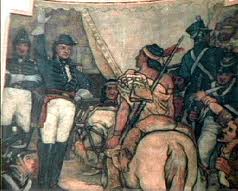People of the Creek War
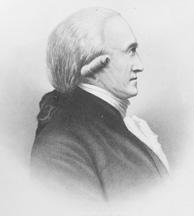
Benjamin Hawkins had been a prosperous landowner and state senator from North Carolina before accepting the job as Agent to the Creeks. When he agreed to be the Principal Agent for all four southern nations of Indians in 1796, he brought his slaves with him from North Carolina to the Agency through which the Federal Road soon passed. The current city of Macon, Georgia grew up where suttlers stores once stood. They cleared and fenced the rich fields and planted orchards as examples to the Indians of what could be planted and grown. Hawkins even had a cotton gin, a wonderful invention that automated separating the cottonseed from the cotton fiber that had only been invented about ten years ago there at the Agency. One of Hawkins’ favorite projects was teaching Indian women to spin their own cloth out of the cotton they grew, thereby decreasing their dependence on credit at the factory, the government operated trading post. This gave women something they could trade, rather than being totally reliant upon the skins their men provided.
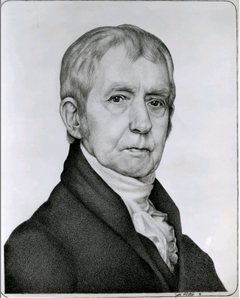
Judge
Toulmin was nearly fifty at the time of the Creek War but all the
responsibilities and cares of his job had him looking much older. His
white hair curled over his stiffly starched white collar escaping the
leather strip with which it was tied. Toulmin prided himself on the
precision of language and his speech was accentuated by a clipped
British accent which some took as British arrogance. Yet his blue eyes
shone kindly above a sharply pointed nose and his demeanor bespoke
humility. Judge Toulmin was highly regarded both for his wisdom and his
humanity. He was a Unitarian minister who had left England to escape
persecution for his beliefs and was recommended by his father’s
colleague, fellow Unitarian, Joseph Priestly, to Thomas Jefferson and
James Madison. They assisted him in acquiring a position at
Transylvania College in Lexington, Kentucky. He became Secretary of
State for the state of Kentucky and compiled the laws for that state.
Thomas Jefferson then appointed him judge of the Federal Court for the
Mississippi Territory. Toulmin and Benjamin Hawkins were good friends.
Editors note: Judge Toulmin's descendants incluude my Delta Delta Delta
sorority sister, Rondi Bates Turner, whose family has remained in the
area and influenced the development of Mobile, Alabama.
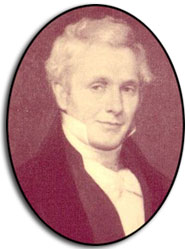
Encyclopedia of Alabama: Note: Younger brother of Edmund Pendleton Gaines
In 1804, Gaines was appointed by the federal government as assistant trader (known then as factor) with the Choctaw Trading House at St. Stephens, Mississippi Territory, in present-day Washington County, Alabama. Federal trading houses, or factories, were expected to provide quality goods at fair prices to local Indians and aid the federal government's efforts to encourage their Indian customers to adopt European American culture. When his new employer, Joseph Chambers, resigned as factor in 1806, Gaines replaced him and established a solid reputation with the tribes, particularly the Choctaws, as well as the settlers along the lower Tombigbee and Tensaw rivers.
He played a prominent role in defending the Mississippi Territory as settlers and Native Americans began to clash over land. Gaines convinced the Choctaws and Chickasaws to help defend the lower Tombigbee and Tensaw settlements after the destruction of Fort Mims by a Creek faction known as the Redsticks in 1813. He actively promoted the Choctaw and Chickasaw alliances and outfitted Choctaw volunteers to fight against the Creeks during the Creek War of 1813-1814.
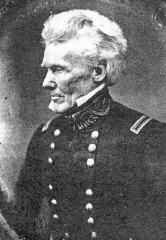
Mississippi History and Encyclopedia of Alabama:
Married to Francis Toulmin. In 1812, at the outbreak of the War of 1812, Gaines re-enlisted as a major in the Eighth U.S. Infantry and then was promoted to lieutenant colonel and commander of the Twenty-fourth U.S. Infantry. Gaines served with distinction in many battles with British forces along the Canadian border. In 1813, he was promoted to colonel and placed in command of the Twenty-fifth U.S. Infantry and then was named adjutant general under general and future U.S. president William Henry Harrison. In March 1814, Gaines was promoted to brigadier general and took command of Fort Erie, near present-day Ontario, successfully defending it from an attack by 3,000 British troops in the Siege of Fort Erie on August 15, 1814. During the battle, a British shell exploded in Gaines's quarters and injured him badly.
Gaines returned to the southeastern frontier in 1816 and resumed his duties in keeping the peace, this time along the borders of Alabama, Georgia, and Spanish Florida. Gaines's headquarters were located at a stockade built under his direction in southern Georgia at a bend in the Chattahoochee River near the border with present-day Alabama. The soldiers named the post Fort Gaines in honor of their general, and it eventually grew into the town of Fort Gaines, Georgia. From 1816 until 1821, Gaines devoted much of his energy to arbitrating disputes arising from the Treaty of Fort Jackson, which was signed by General Andrew Jackson and Creek leaders in the aftermath of the Battle of Horseshoe Bend. Squatting by white settlers and the forced cession of 23 million acres of Creek land led to violent clashes along the borders between Alabama and Georgia and Georgia and Spanish Florida. It was often Gaines's responsibility to forcibly evict white squatters and Native Americans from lands to which they had restricted access. Gaines also often corresponded with the governor of Spanish Florida to negotiate the policies of the southeastern frontier region.
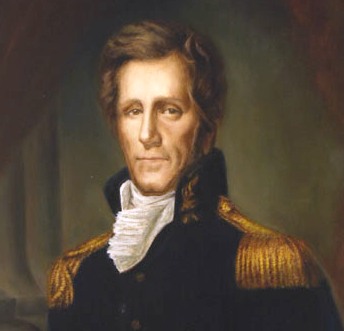
James Madison
March 4, 1809 – March 4, 1817
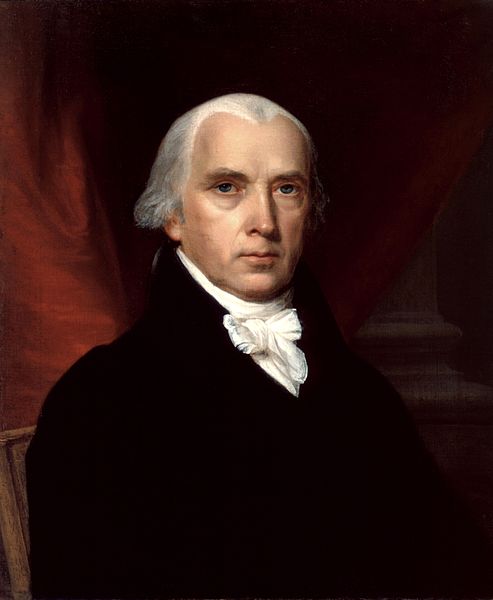
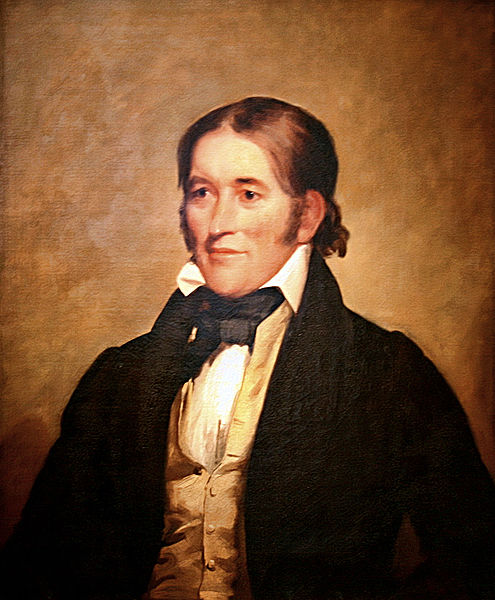
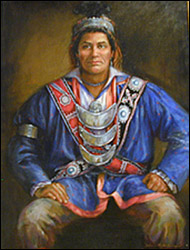

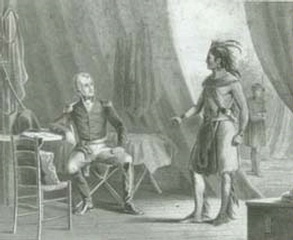
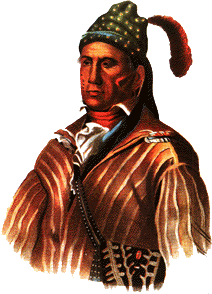
As war chief, Menawa of Okfuskee had gathered about 1,000 warriors and over 300 women and children inside the loop of the Tallapoosa River known as Horseshoe Bend. With the direction of William Weatherford, he built about 400 feet of breastworks to close the loop on the land side Menawa, forty-seven, was one of the wealthiest of all the Creeks. He was famous for his herds of cattle and horses and his large quantity of hogs. As a youth, he had conducted annual horse stealing forays into Tennessee that brought about his name Hothelepoya or Crazy Trouble Hunter. When he became war chief, he gained the name Menawa. Before the war broke out, he was operating a store and enjoying his prosperity at Okfuskee.
